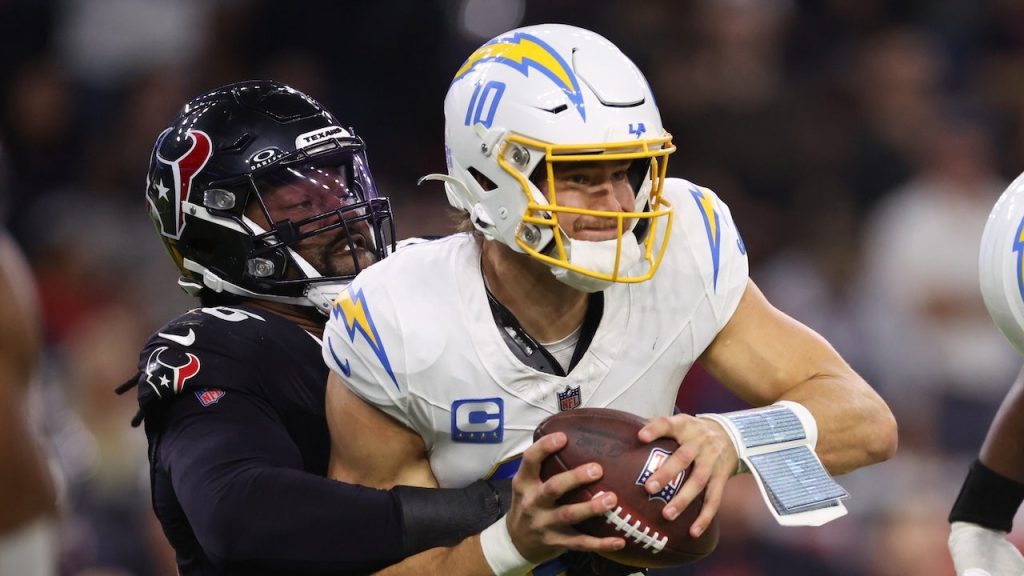Justin Herbert’s playoff woes continued Saturday, as the Los Angeles Chargers quarterback delivered arguably the worst performance of his young career in a 32-12 Wild Card round loss to the Houston Texans. Herbert, who threw just three interceptions during the entire regular season, tossed four picks against the Texans, completing only 14 of 32 passes. This dismal showing stands in stark contrast to his regular season efficiency, where he joined elite quarterbacks like Tom Brady and Aaron Rodgers in the exclusive club of quarterbacks with three or fewer interceptions. The loss drops Herbert to an 0-2 record in playoff games, further solidifying the narrative surrounding his struggles on the biggest stage. His previous playoff appearance ended in a historic collapse against the Jacksonville Jaguars in the 2022 Wild Card round, leaving a lingering question mark over his ability to perform under pressure.
Herbert’s four-interception game ignited a firestorm of criticism on social media, with fans and analysts dissecting his every throw and decision. The weight of expectations placed upon the young quarterback, coupled with his inability to deliver in crucial moments, has become a recurring theme in his nascent playoff career. The contrast between his regular season prowess and postseason struggles is perplexing, raising questions about his mental fortitude and ability to adapt to the heightened intensity of playoff football. The Chargers’ offensive struggles extended beyond Herbert’s interceptions, as the team failed to establish a consistent rhythm and capitalize on scoring opportunities.
The game also witnessed a rare and historically significant play involving a blocked extra point. In the fourth quarter, following a Chargers touchdown, Houston’s D’Angelo Ross scooped up a blocked extra point attempt and returned it for two points. This marked the first such occurrence in NFL postseason history, adding a unique footnote to an otherwise forgettable game for the Chargers. The play unfolded after Ladd McConkey’s 86-yard touchdown reception narrowed the Texans’ lead. Cameron Dicker’s extra point attempt was blocked by Denico Autry, sending the ball skyward. Dicker attempted to bat the ball down, but it deflected off his hands and into the waiting arms of Ross, who secured it and sprinted into the end zone for the two-point conversion.
This unusual score extended Houston’s lead to 25-12, further demoralizing the Chargers and highlighting their special teams woes. The NFL implemented the two-point return rule for blocked extra points in 2015, replacing the previous rule where such plays resulted in a dead ball. Ross’s return marked the ninth instance of a blocked extra point returned for two points since the rule change, with the most recent occurrence coming in the 2024 regular season when the Philadelphia Eagles executed the same play against the Tampa Bay Buccaneers. The play underscored the unpredictable nature of football and the importance of special teams execution, even in seemingly routine situations.
For the Chargers, the loss extends their playoff win drought to six consecutive seasons. The franchise hasn’t tasted postseason victory since 2018, when then-quarterback Philip Rivers led them to a Wild Card win over the Baltimore Ravens. The repeated playoff failures raise concerns about the team’s overall direction and their ability to build a consistent winning culture. The pressure to break this streak will undoubtedly mount in the coming seasons, placing even greater scrutiny on Herbert and the coaching staff.
On the other hand, the Houston Texans celebrated their second consecutive playoff victory, solidifying their status as a rising force in the AFC. Led by quarterback C.J. Stroud and head coach DeMeco Ryans, the Texans appear to have found a winning formula, combining a dynamic offense with a resilient defense. Their success stands in stark contrast to the Chargers’ struggles, further highlighting the growing disparity between the two franchises. As the Texans continue to build upon their recent success, the Chargers face an offseason filled with questions and uncertainty, searching for answers to their persistent playoff woes.

